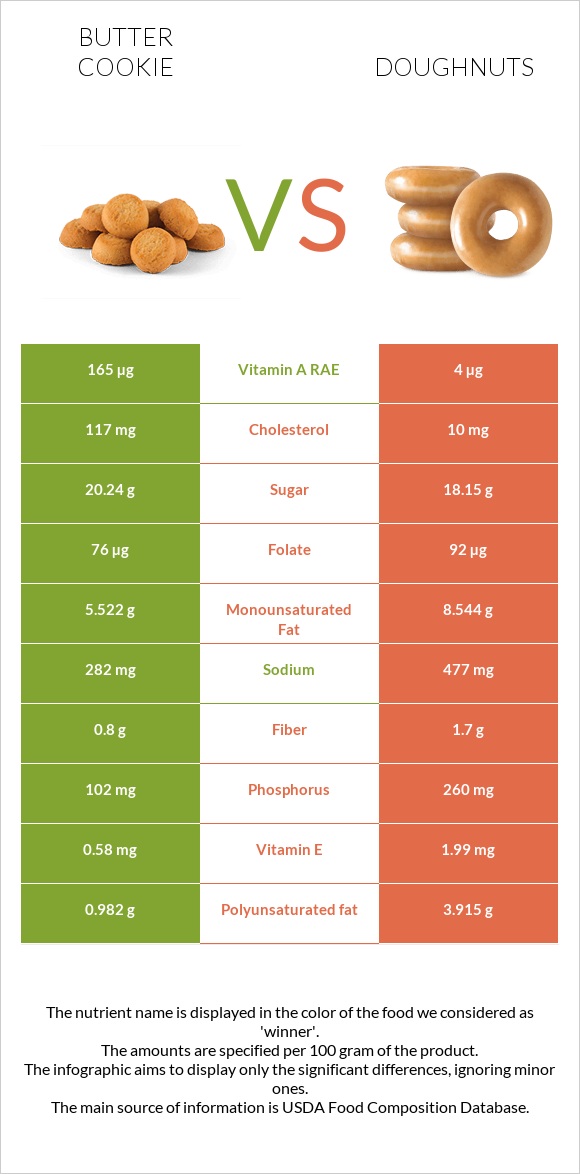Butter cookie vs. Doughnuts — In-Depth Nutrition Comparison
Compare
Summary of differences between butter cookie and doughnuts
- Butter cookie has more vitamin A, vitamin B12, and copper; however, doughnuts are higher in phosphorus, vitamin E, manganese, vitamin K, and choline.
- Butter cookie covers your daily need for cholesterol, 36% more than doughnuts.
- Butter cookie has 48 times more vitamin A than doughnuts. While butter cookie has 673 IU of vitamin A, doughnuts have only 14 IU.
- Doughnuts have less cholesterol.
- The glycemic index of doughnuts is higher.
These are the specific foods used in this comparison Cookies, butter, commercially prepared, enriched and Doughnuts, cake-type, plain (includes unsugared, old-fashioned).
Infographic

Infographic link
Mineral Comparison
Mineral comparison score is based on the number of minerals by which one or the other food is richer. The "coverage" charts below show how much of the daily needs can be covered by 300 grams of the food.
| Contains more CopperCopper | +122.2% |
| Contains less SodiumSodium | -40.9% |
| Contains more MagnesiumMagnesium | +41.7% |
| Contains more CalciumCalcium | +37.9% |
| Contains more PotassiumPotassium | +20.7% |
| Contains more IronIron | +14% |
| Contains more ZincZinc | +31.6% |
| Contains more PhosphorusPhosphorus | +154.9% |
| Contains more ManganeseManganese | +95.9% |
| Contains more SeleniumSelenium | +20.2% |
Vitamin Comparison
Vitamin comparison score is based on the number of vitamins by which one or the other food is richer. The "coverage" charts below show how much of the daily needs can be covered by 300 grams of the food.
| Contains more Vitamin AVitamin A | +4025% |
| Contains more Vitamin DVitamin D | +∞% |
| Contains more Vitamin B2Vitamin B2 | +11.3% |
| Contains more Vitamin B5Vitamin B5 | +29.4% |
| Contains more Vitamin B12Vitamin B12 | +500% |
| Contains more Vitamin EVitamin E | +243.1% |
| Contains more Vitamin B6Vitamin B6 | +38.9% |
| Contains more Vitamin KVitamin K | +476.5% |
| Contains more FolateFolate | +21.1% |
All nutrients comparison - raw data values
| Nutrient |  |
 |
DV% diff. |
| Cholesterol | 117mg | 10mg | 36% |
| Phosphorus | 102mg | 260mg | 23% |
| Polyunsaturated fat | 0.982g | 3.915g | 20% |
| Vitamin A | 165µg | 4µg | 18% |
| Vitamin B12 | 0.36µg | 0.06µg | 13% |
| Copper | 0.2mg | 0.09mg | 12% |
| Starch | 25.91g | 11% | |
| Fats | 18.8g | 24.93g | 9% |
| Vitamin E | 0.58mg | 1.99mg | 9% |
| Sodium | 282mg | 477mg | 8% |
| Monounsaturated fat | 5.522g | 8.544g | 8% |
| Carbs | 68.9g | 47.06g | 7% |
| Manganese | 0.17mg | 0.333mg | 7% |
| Vitamin K | 1.7µg | 9.8µg | 7% |
| Choline | 6.5mg | 37.3mg | 6% |
| Iron | 2.22mg | 2.53mg | 4% |
| Fiber | 0.8g | 1.7g | 4% |
| Folate | 76µg | 92µg | 4% |
| Selenium | 8.4µg | 10.1µg | 3% |
| Vitamin B2 | 0.335mg | 0.301mg | 3% |
| Calories | 467kcal | 434kcal | 2% |
| Protein | 6.1g | 5.31g | 2% |
| Vitamin D | 16 IU | 0 IU | 2% |
| Vitamin D | 0.4µg | 0µg | 2% |
| Vitamin B1 | 0.37mg | 0.39mg | 2% |
| Vitamin B3 | 3.19mg | 2.91mg | 2% |
| Vitamin B5 | 0.488mg | 0.377mg | 2% |
| Magnesium | 12mg | 17mg | 1% |
| Calcium | 29mg | 40mg | 1% |
| Potassium | 111mg | 134mg | 1% |
| Zinc | 0.38mg | 0.5mg | 1% |
| Vitamin B6 | 0.036mg | 0.05mg | 1% |
| Net carbs | 68.1g | 45.36g | N/A |
| Sugar | 20.24g | 18.15g | N/A |
| Saturated fat | 11.051g | 11.105g | 0% |
| Tryptophan | 0.084mg | 0% | |
| Threonine | 0.215mg | 0% | |
| Isoleucine | 0.277mg | 0% | |
| Leucine | 0.471mg | 0% | |
| Lysine | 0.308mg | 0% | |
| Methionine | 0.131mg | 0% | |
| Phenylalanine | 0.299mg | 0% | |
| Valine | 0.315mg | 0% | |
| Histidine | 0.136mg | 0% | |
| Omega-3 - EPA | 0.011g | 0g | N/A |
| Omega-3 - DHA | 0.007g | 0.001g | N/A |
| Omega-3 - ALA | 0.239g | N/A | |
| Omega-3 - Eicosatrienoic acid | 0.001g | N/A | |
| Omega-6 - Gamma-linoleic acid | 0.017g | N/A | |
| Omega-6 - Eicosadienoic acid | 0.006g | N/A | |
| Omega-6 - Linoleic acid | 3.573g | N/A |
Macronutrient Comparison
Macronutrient breakdown side-by-side comparison
Protein:
6.1 g
Fats:
18.8 g
Carbs:
68.9 g
Water:
4.6 g
Other:
1.6 g
Protein:
5.31 g
Fats:
24.93 g
Carbs:
47.06 g
Water:
20.82 g
Other:
1.88 g
| Contains more ProteinProtein | +14.9% |
| Contains more CarbsCarbs | +46.4% |
| Contains more FatsFats | +32.6% |
| Contains more WaterWater | +352.6% |
| Contains more OtherOther | +17.5% |
Fat Type Comparison
Fat type breakdown side-by-side comparison
Saturated fat:
Sat. Fat
11.051 g
Monounsaturated fat:
Mono. Fat
5.522 g
Polyunsaturated fat:
Poly. Fat
0.982 g
Saturated fat:
Sat. Fat
11.105 g
Monounsaturated fat:
Mono. Fat
8.544 g
Polyunsaturated fat:
Poly. Fat
3.915 g
| Contains more Mono. FatMonounsaturated fat | +54.7% |
| Contains more Poly. FatPolyunsaturated fat | +298.7% |
~equal in
Saturated fat
~11.105g





